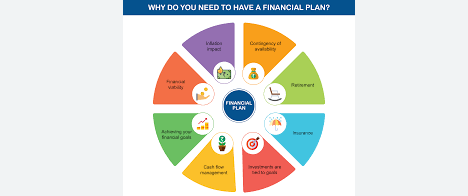A financial plan is a thorough assessment of an individual’s present and future financial state. It provides a direction for individuals to determine their financial aspirations and create a plan of action to accomplish them. The plan considers an individual’s income, expenditures, assets, debts, and investments to assist them in making informed decisions regarding their finances and achieving their financial objectives.
Introduction
With the increase in financial challenges and uncertainties, managing finances has become crucial in today’s world. The significance of having a financial plan cannot be emphasized enough. It acts as a tool that assists individuals in navigating their financial goals and objectives, analysing their current financial status, and devising a strategy to achieve their ambitions. The procedure for creating a financial plan involves recognizing financial objectives, evaluating income, expenses, assets, and liabilities, and forming a budget. Crafting a financial plan gives individuals a feeling of authority over their finances and facilitates informed decision-making. This article delves into the concept of a financial plan, its importance, and the steps to create one for your future.
Understanding Financial Planning
The process of financial planning involves examining an individual’s present financial status, recognizing their financial aspirations, and devising a strategy to accomplish those objectives. This involves analysing an individual’s income, expenses, assets, and debts while evaluating their tolerance towards risk and duration of investment. The prime aim of financial planning is to ensure that an individual is financially stable and capable of meeting their present and upcoming financial commitments. A holistic financial plan incorporates several elements such as estate planning, retirement planning, insurance, tax planning, and risk management. Efficient financial planning enables individuals to make informed decisions and handle their finances adeptly.
Key Elements of a Financial Plan
Included in a financial plan are various aspects of an individual’s financial life, which makes it a comprehensive tool. Here are the fundamental elements that are usually part of a financial plan:
- Financial objectives: Identifying both short-term and long-term financial objectives and determining the resources required to accomplish them.
- Budgeting: Creating a plan to manage income and expenses, including tracking expenses, controlling spending, and saving for future objectives.
- Investment planning: Identifying the right investment options to achieve financial goals, assessing risk tolerance, and evaluating investment alternatives.
- Retirement planning: Determining the required amount of money for a comfortable retirement and devising a strategy to achieve that objective.
- Risk management: Identifying potential risks such as illness, disability, or death and creating a plan to reduce those risks through insurance.
- Tax planning: Evaluating tax liabilities and devising strategies to minimise taxes through tax-efficient investments and deductions.
- Estate planning: Planning for asset distribution after death, including creating a will, setting up trusts, and minimising estate taxes.
Incorporating these essential elements into a financial plan ensures that individuals can achieve their financial objectives and lead a secure financial life.
Steps to Create a Financial Plan
To create a financial plan, it is important to follow several steps, which include defining financial goals, assessing the current financial situation, developing a budget, evaluating investment options, planning for retirement, mitigating risks, minimising taxes, and planning for estate distribution. Short-term and long-term financial objectives need to be determined first, followed by identifying income, expenses, assets, and liabilities. Creating a plan to manage income and expenses, evaluating investment options, and planning for retirement is essential. It is also important to mitigate potential risks through insurance, minimise taxes through tax-efficient investments and deductions, and plan for asset distribution after death. By following these steps, individuals can create a comprehensive financial plan and achieve their financial objectives.
Tips for Successful Financial Planning
To achieve financial security, successful financial planning is essential. Below are some tips that can help in creating a successful financial plan:
- Establish achievable financial goals and assess progress regularly.
- Develop and stick to a budget that monitors income and expenses.
- Save money for emergencies and unforeseen expenses.
- Diversify investments to reduce risk and maximise returns.
- Periodically review and rebalance investment portfolios.
- Keep track of debts and aim to pay them off.
- Evaluate and update insurance policies to ensure appropriate coverage.
- Work with a financial advisor to develop and implement a comprehensive financial plan.
By adhering to these suggestions, individuals can develop a successful financial plan and achieve their financial objectives.
Conclusion
To summarise, financial planning is a crucial element of an individual’s financial life, enabling them to achieve their financial goals and lead a financially secure life. An effective financial plan encompasses various aspects, including budgeting, investment planning, retirement planning, risk management, tax planning, and estate planning. By following the steps outlined in creating a financial plan and adopting the tips for successful financial planning, individuals can create a roadmap to achieve their financial goals and build a stable financial future. It is important to review and adjust the financial plan regularly to ensure it stays relevant to changing circumstances. By making informed decisions and taking control of their finances, individuals can attain financial security and peace of mind.







